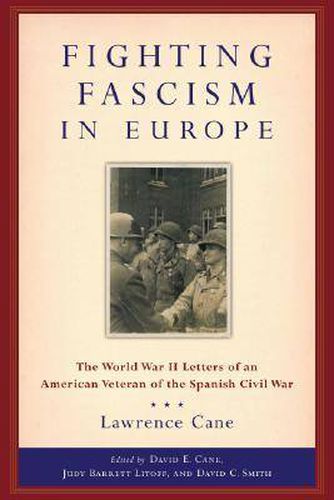Readings Newsletter
Become a Readings Member to make your shopping experience even easier.
Sign in or sign up for free!
You’re not far away from qualifying for FREE standard shipping within Australia
You’ve qualified for FREE standard shipping within Australia
The cart is loading…






On his first day in basic training in 1942, Lawrence Cane wrote to his wife Grace from Fort Dix, New Jersey. I’m in the army now - really! , he wrote, complaining, I don’t have enough time to write a decent letter . Three years later, Captain Lawrence Cane went home from World War II. He’d landed at Utah Beach on D-Day, helped liberate France and Belgium, and survived the Battle of the Bulge. He won a Silver Star for bravery. And he still managed to write 300 letters home to Grace. This book is a different kind of war story - both a powerful chronicle of life in battle and a unique portrait of courage fuelled by a life-long passion for political justice. Cane’s fight for freedom began well before D-Day. In 1937, he joined the Abraham Lincoln Battalion and got wounded fighting for democracy in Spain. In 1942, at age 30, he enlisted in the new war against fascism, and as an officer with the 238th Combat Engineer Battalion, went ashore in Normandy to clear mines, destroy fortifications and open roads from Normandy to the Siegfried Line. Of the 400 Spanish Civil War veterans in World War II, Cane was the only one to go ashore on D-Day. After the war, Lawrence Cane fought for civil rights and peace until his death in 1976. Discovered in 1995 by Cane’s son David, his letters are not only classic accounts of war and unforgettable expressions of love for family, they are the fiercely patriotic words of a left-wing, working class, New York Jew (and one-time Communist Party member) who knew exactly why we fought - to create a better world by destroying all forms of fascism, one battle at a time. With an introduction by David Cane, detailed notes, and much additional material, these letters add a new dimension to the meaning of American patriotism and a valuable chapter to the history of the greatest generation .
$9.00 standard shipping within Australia
FREE standard shipping within Australia for orders over $100.00
Express & International shipping calculated at checkout
Stock availability can be subject to change without notice. We recommend calling the shop or contacting our online team to check availability of low stock items. Please see our Shopping Online page for more details.
On his first day in basic training in 1942, Lawrence Cane wrote to his wife Grace from Fort Dix, New Jersey. I’m in the army now - really! , he wrote, complaining, I don’t have enough time to write a decent letter . Three years later, Captain Lawrence Cane went home from World War II. He’d landed at Utah Beach on D-Day, helped liberate France and Belgium, and survived the Battle of the Bulge. He won a Silver Star for bravery. And he still managed to write 300 letters home to Grace. This book is a different kind of war story - both a powerful chronicle of life in battle and a unique portrait of courage fuelled by a life-long passion for political justice. Cane’s fight for freedom began well before D-Day. In 1937, he joined the Abraham Lincoln Battalion and got wounded fighting for democracy in Spain. In 1942, at age 30, he enlisted in the new war against fascism, and as an officer with the 238th Combat Engineer Battalion, went ashore in Normandy to clear mines, destroy fortifications and open roads from Normandy to the Siegfried Line. Of the 400 Spanish Civil War veterans in World War II, Cane was the only one to go ashore on D-Day. After the war, Lawrence Cane fought for civil rights and peace until his death in 1976. Discovered in 1995 by Cane’s son David, his letters are not only classic accounts of war and unforgettable expressions of love for family, they are the fiercely patriotic words of a left-wing, working class, New York Jew (and one-time Communist Party member) who knew exactly why we fought - to create a better world by destroying all forms of fascism, one battle at a time. With an introduction by David Cane, detailed notes, and much additional material, these letters add a new dimension to the meaning of American patriotism and a valuable chapter to the history of the greatest generation .